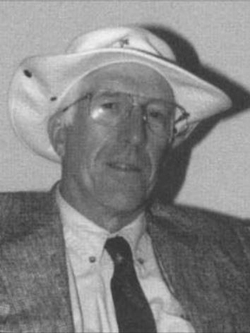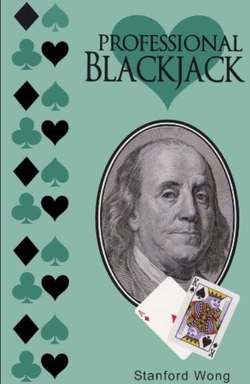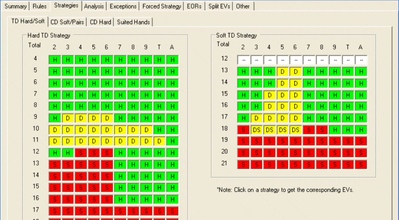 Stanford Wong is actually the pen name of a man called John Ferguson, a California resident born in Georgia in 1943. His pseudonym is made up of his alma mater (Stanford) and then the Asian name Wong, which was intended to give the author an air of Asian mystery and also put people off the scent of his real identity.
Stanford Wong is actually the pen name of a man called John Ferguson, a California resident born in Georgia in 1943. His pseudonym is made up of his alma mater (Stanford) and then the Asian name Wong, which was intended to give the author an air of Asian mystery and also put people off the scent of his real identity.
As a child, Ferguson loved to win. He became obsessed with games like tic tac toe (naughts and crosses to us Brits) and spent hours figuring out how to become unbeatable at it. He was unbeatable in his class, even the teachers couldn’t get one past him.
He was introduced to blackjack when he was just 12 years old, and the game instantly took his interest. He set to work figuring out the best strategies to beat the dealer, and by 14 years old he had come up with a pretty robust approach.
He was still way too young to visit a casino though, so instead he filled his time reading about the game and soaking up as much information as he could – he was one of the many influenced by Edward O Thorp’s ‘Beat the Dealer’ which was released around the same time Ferguson turned 21.
He played for practise through college, mastering his skills, but as soon as he was of legal age Ferguson made his way to the casinos in Reno and Lake Tahoe and, already proficient in card counting from years of practice, he made 50% on his bankroll on his first attempt.
His career as a gambler had begun.
Teacher, Soldier, Professional Gambler

Credit: Manhhai Flickr
After college Ferguson went straight into work as a teacher, lecturing in various subjects all surrounding finance, business, and maths.
He still gambled whenever he could, during weekends, evenings and days off, but was becoming frustrated with how little time he had available to dedicate to his real passion.
His life was interrupted in 1968 when, at the age of 25 he was drafted into the United States Army for two years, a year of which saw him posted for a tour of Vietnam during the deadly conflict there.
He returned from his stint in the army unharmed, picked up right where he left off, but his service had taught him that life was for living, so he was determined to make his way out of teaching as soon as he could.
It took him a few years, but by 1976 he was earning more playing blackjack in his spare time than he was for doing his full time job. The time had come. Ferguson struck a deal with the college that he would complete the last term of his contract for the princely sum of $1, if he could be excused from all faculty meetings. They agreed, and he spent this extra time bedding in at the casinos, and getting ready to go full time as a blackjack player.
Releasing Professional Blackjack
 During these years, John had been writing papers, keeping notes, and creating charts for the various different versions of blackjack that different casinos might play.
During these years, John had been writing papers, keeping notes, and creating charts for the various different versions of blackjack that different casinos might play.
He didn’t start out wanting to write a book but realised that he had pretty much all of the content he would need if he were to write one, so he cobbled it all together, made a few amendments, and without trying too hard ‘Professional Blackjack’ was ready for publication.
This is when he adopted the moniker of Stanford Wong. He realised that if he published under his real name he would be barred from all the casinos where he liked to play (and profit) which would be a real case of shooting himself in the foot.
The book was successful for a niche title, but a real testament to its calibre is that sales increased year on year as the word spread. It was still selling roughly 5,000 copies a year back in 2005, 30 years after its’ release.
Stanford Wong would go on to write and publish 11 books in all, covering sports betting, racing, video poker, pai gow, even craps. He also owns the Pi Yee Press publishing company, who sell and publish gambling related books, many of which have been written by Stanford but the library does include other authors as well.
One of the techniques described in the book you may have heard of: wonging. This is where a player watches a game and keeps count, then when the shoe is strong the player steps in and starts betting big, capitalising on the strong count. This led to the ‘no mid shoe entry’ rule employed by many casinos today.
Blackjack Analyzer
 Another thing Wong is known for is inventing one of the first commercially available examples of blackjack odds analysing software.
Another thing Wong is known for is inventing one of the first commercially available examples of blackjack odds analysing software.
The name may not be very imaginative but at the time this was released it was revolutionary, harnessing technology for gambling purposes before others had caught on.
It was developed for personal use initially, and Wong would use it with members of his advantage play black jack team to go through scenarios, but he made it available to the public eventually.
It was especially useful for anyone new to blackjack who wasn’t quite convinced of the strategies Wong advertised, as they could literally pick the table rules and then see the results in front of their eyes and also test their abilities. The program would tell them if they were making a less than optimal decision.
He released another version of the program which incorporated card counting techniques a few years later.
Stanford Wong Now

Although he is now an old man, Stanford Wong is still active in the blackjack community, but less so in the casinos themselves.
He was inducted into the blackjack hall of fame in 2002, its inaugural year, and his true identity has been public knowledge for a long time now, making playing more difficult for him. Not only were casino managers more likely to recognise him but other players would regularly expose him as they were fans.
He had been running his website, BJ21, since the early days of the internet though, and this is something he continues to do to this day. The site offers everything a blackjack enthusiast could want from training to news articles, and its’ message boards are a popular online meeting place for players.
Stanford Wong/John Ferguson lives in La Jolla, just outside of San Diego, with his wife. They have two children (who were taught to play blackjack from an early age) although they are now both adults.
A fan of travelling, Stanford is still able to play in some of the countries he visits, but on home turf he is basically retired as a player.
